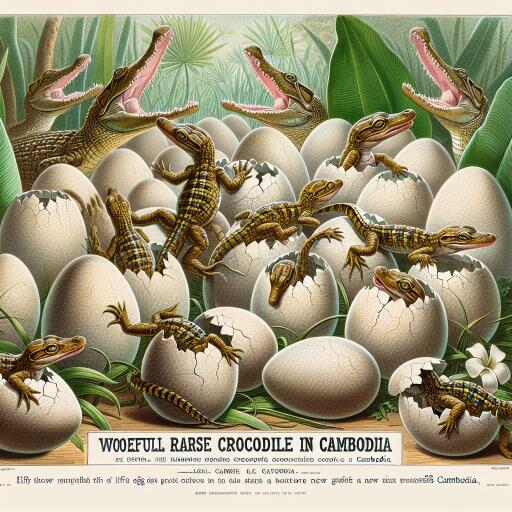
‘Hope’ as 60 Rare Siamese Crocodiles Hatch in Cambodia
In a significant boost to conservation efforts, the recent hatching of 60 rare Siamese crocodile eggs in Cambodia’s Cardamom National Park has been announced, offering a glimmer of hope for one of the planet’s most critically endangered reptiles. This event marks a remarkable success in the protection of these ancient creatures, highlighting Cambodia’s ongoing commitment to preserving its unique biodiversity.
The discovery of five Siamese crocodile nests in mid-May by the Cambodian Ministry of Environment and Agriculture, in collaboration with conservation organization Fauna and Flora, was the first sign of success. Out of the 106 eggs found, 66 were determined to be fertilized. By the end of June, 60 of these had hatched, signaling a potentially pivotal moment for the species’ survival in the wild.
With global numbers estimated at only around 1,000 individuals, including roughly 300 in Cambodia, the Siamese crocodile finds itself on the brink of extinction. The primary threats to their survival stem from poaching activities, which see their eggs and adult reptiles being snatched away to supply crocodile farms across the region. Here, they are bred for their skins, coveted for the manufacturing of luxury accessories such as belts, shoes, and handbags.
The successful hatching in Cardamom National Park is particularly significant, as it underscores the park’s importance as a safe haven for natural populations of the Siamese crocodile. The Cambodian Environment Minister expressed immense pride in this achievement, emphasizing the nation’s dedication to the conservation of rare and endangered species. Their efforts aim not only to protect but also to enhance the rich tapestry of Cambodian wildlife against the backdrop of global biodiversity loss.
Cambodia, despite its rich ecological assets, faces significant environmental challenges, including deforestation and poaching, exacerbated by rapid development and industrialization. The nation has been under scrutiny for allowing expansive tracts of forest land, some within protected areas, to be cleared for agricultural and infrastructural projects, ranging from plantations to hydropower installations.
However, the emergence of 60 new Siamese crocodiles in the wild offers more than just a momentary celebratory milestone; it represents a beacon of hope for the future. This development underscores the resilience of nature when given a chance to recover and the critical role conservation efforts play in reversing the fortunes of the planet’s most endangered species. Cambodian authorities’ committed stance on biodiversity preservation is a powerful reminder of the need for continued global cooperation in protecting our natural world for generations to come.
As we celebrate this conservation triumph, it’s crucial to remember that each hatchling represents a step forward in the fight against the extinction of species like the Siamese crocodile. Through continued vigilance, research, and protection efforts, we can aspire to see these ancient reptiles thrive once again in the wild landscapes of Cambodia and beyond.





Leave a Reply